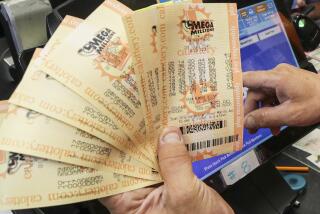Those Longer Lotto Odds
- Share via
Just as everyone expected, and feared, the California Lottery keeps escalating the hysteria level to get more and more people to play. The curious thing about the latest move of the California Lottery Commission, however, is that in order to get more people to spend more money on the lottery, the commission is making it harder to win.
From the outset, players in the Lotto game had to pick the correct six numbers from a field of 49 to win the big Saturday prize. Then the commission added a Wednesday drawing. Now it is increasing the field from 49 numbers to 53. It seems that a prize of $5 million or $10 million is just not sufficient to get jaded players to play enough. By increasing the odds, the commission lessens the chance of someone winning the Wednesday or Saturday drawing. Thus the prize will roll over from one lottery night to the next and build in size. This is necessary “to maintain the excitement of the Lotto game,” a commission official says. Some logic. How big is big enough? Fifty million dollars? A hundred million?
Perhaps to soften the criticism of making the long Lotto odds even longer, and ostensibly to give players all sorts of options, there will be new games that allow people to have a greater chance of winning smaller prizes. Even so, the odds of winning anything at all in the lottery will increase from 1 in 54 to 1 in 67. The odds on catching the big Lotto prize will go from 1 in 14 million to 1 in 22 million.
The frantic lottery ads still tout the benefits to California education from playing the lottery. But Neal R. Peirce was correct when he wrote in the National Journal earlier this year that state lotteries have become “a massive, regressive debilitating tax--especially on lower-income people.” Peirce proposed a number of actions to bring lotteries under control that should be considered by the California Legislature. One is to ban lottery advertising. Another is to cap the size of jackpots. A third is to limit the proliferation of lottery outlets, such as the mini-lottery terminals established in some California supermarket checkout lines.
The lottery is a sordid adjunct to public policy. Every time the state cranks up the hysteria to get more people to play, it becomes just that much more sordid.
More to Read
Go beyond the scoreboard
Get the latest on L.A.'s teams in the daily Sports Report newsletter.
You may occasionally receive promotional content from the Los Angeles Times.










